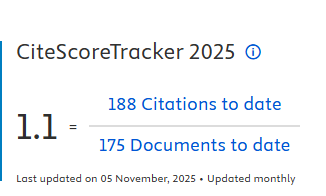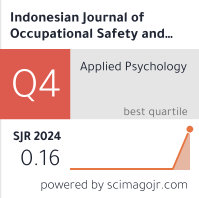Correlation between Working Postures and The Complaints of Musculoskeletal Diseases of The Fishermen in Tanjung Village, Sumenep District
Downloads
Introduction: The working activities of the fishermen in Tanjung Village are still considered as traditional works providing the works are done manually with non-ergonomic working postures, such as bending, standing, squatting, and legs bending. Accordingly, these postures trigger the complaints of musculoskeletal diseases (MSDs). Musculoskeletal diseases are diseases in the skeletal muscles, for example, pains, aches, pins and needles, and heat. Working as a fisherman means that one dedicates half of her/his time to catch fish mostly by using traditional boats and equipment. Thus, a lot of fishermen are discovered complaining about pains after completing their work. This research aims to distinguish the relationship among variables. Methods: This research is observational research that applies the cross-sectional design. The research samples as many as 56 fishermen are chosen by implementing the cluster random sampling technique. The data are obtained by completing measurements, interview, and observation by applying the Rapid Entire Body Assessment (REBA) method and by distributing the Nordic Body Map (NBM) questionnaires. Results: As many as 73.2% of the fishermen have a high risk of musculoskeletal diseases and 46.4% have been working in high-risk working postures. Conclusion: The working postures have a weak relationship (r=0.407) with the complaints of musculoskeletal diseases.
Keywords: fishermen, complaints of musculoskeletal diseases, Nordic Body Map, Rapid Entire Body Assessment
Bedu, H. H. S., Russeng, S. S. and Rahim, M. R. (2013) Faktor Yang Berhubungan Dengan Gangguan Muskuloskeletal Pada Cleaning Service Di Rsup Dr Wahidin Sudirohusodo Makasar. Scientific Articles. Makassar: Faculty of Public Health, Universitas Hasanuddin.
Budiman, F. (2015) ‘Hubungan Posisi Kerja Angkat dengan Keluhan Musculoskeletal Disorder pada Nelayan Tangkap di Muara Angke Kelurahan Pluit Jakarta Utara', Forum Ilmiah, 12(1), pp. 23–32.
Directorate General of Public Health and Occupational Health Development (2014) Pedoman Upaya Kesehatan Kerja bagi Masyarakat Perikanan (untuk Petugas Kesehatan). Jakarta: Ministry of Health of the Republic of Indonesia.
Grandjean, E. (1993) Fitting the Task to the Man: an Ergonomic Approach. 4th edn. London: Taylor & Francis Ltd.
Health Research and Development Agency (2013) Riset Kesehatan Dasar. Jakarta.
International Labour Organization (2013) The Prevention of Occupational Diseases. Geneva: International Labour Organization.
Jalajuwita, R. N. and Paskarini, I. (2015) ‘Hubungan Posisi Kerja dengan Keluhan Muskuloskeletal pada Unit Pengelasan PT. X Bekasi', The Indonesian Journal of Occupational Safety and Health, 4(1), pp. 33–42.
Krisdianto, Sujoso, A. D. P. and Hartanti, R. I. (2015) Hubungan Faktor Individu dan Fakator Pekerjaan dengan Keluhan Muskuloskeletal akibat Kerja (Studi pada Nelayan di Desa Puger Wetan Kecamatan Puger Kabupaten Jember ), Artikel Ilmiah Hasil Penelitian Mahasiswa. Jember: Faculty of Public Health, Universitas Jember.
Kurnianto, R. Y. (2017) ‘Gambaran Postur Kerja dan Risiko Terjadinya Muskuloskeletal pada Pekerja Bagian Welding di Area Workshop Bay 4.2 PT. Alstom Power Energy Systems Indonesia', The Indonesian Journal of Occupational Safety and Health, 6(2), pp. 245–256.
Merulalia (2010) Postur Tubuh yang Ergonomis Saat Bekerja. Jakarta: Bhuana Ilmu Populer.
Ministry of Health of the Republic of Indonesia (2009) Profil Kesehatan Republik Indonesia Tahun 2009. Jakarta: Ministry of Health of the Republic of Indonesia.
Ministry of Law and Human Rights of the Republic of Indonesia (2016) Undang-Undang Republik Indonesia Nomor 7 Tahun 2016 tentang Perlindungan Dan Pemberdayaan Nelayan, Pembudi Daya Ikan, Dan Petambak Garam. Jakarta: Ministry of Law and Human Rights of the Republic of Indonesia.
Ministry of Manpower and Transmigration (2003) Undang-undang Republik Indonesia No. 13 Tahun 2003 tentang Ketenagakerjaan. Jakarta: Kementerian Tenaga Kerja dan Transmigrasi.
Occupational Safety and Health Administration (2016) Musculoskeletal Disorders in Fisheries, OSH Wiki.
Putri, B. A. (2017) Faktor yang Berhubungan dengan Keluhan MSDs pada Pekerja bagian Produksi PT X Sidoarjo. Undergraduate Thesis. Surabaya: Faculty of Public Health, Universitas Airlangga.
Sang, A., Djajakusli, R. and Russeng, S. S. (2013) Hubungan Risiko Postur Kerja dengan Keluhan Musculoskeletal Disorders (MSDs) pada Pemanen Kelapa Sawit Di PT. Sinergi Perkebunan Nusantara. Scientific Articles. Makassar: Faculty of Public Health, Universitas Hasanuddin.
Sastrowinoto, S. (1985) Meningkatkan Produktivitas dengan Ergonomi. Jakarta: Pustaka Binaman Pressindo.
Sholihah, Q. (2013) Keselamatan dan Kesehatan Kerja: Konsep, Perkembangan dan Implementasi Budaya Keselamatan. Jakarta: Penerbit Buku Kedokteran EGC.
Tarwaka (2011) Ergonomi Industri. Surakarta: Harapan Press Solo.
Tarwaka (2014) Ergonomi Industri: Dasar-Dasar Ergonomi dan Implementasi di Tempat Kerja. 2nd edn. Surakarta: Harapan Press.

In order to be accepted and published by The Indonesian Journal of Occupational Safety and Health, Author(s) who submit an article should complete all the review process. The copyright of received articles assigned to the The Indonesian Journal of Occupational Safety and Health and Department of Safety and Health, Universitas Airlangga as publishers of the journal. The intended copyright includes the rights to publish articles in various forms (including reprints).
The Editorial Team of The Indonesian Journal Of Occupational Safety and Health and Department of Safety and Health strive to ensure that no errors occur in the articles that have been published, both data errors and statements in the article.
Users of this website will be licensed to use materials from this website following the Creative Commons Attribution-NonCommercial-ShareAlike 4.0 International License. No fees charged. Please use the materials accordingly.
------------------------------------------------------------------------------------------------------------------------------------------------------------------------------------------
Attribution ” You must give appropriate credit, provide a link to the license, and indicate if changes were made. You may do so in any reasonable manner, but not in any way that suggests the licensor endorses you or your use.
NonCommercial ” You may not use the material for commercial purposes.
ShareAlike ” If you remix, transform, or build upon the material, you must distribute your contributions under the same license as the original.







 How to Submit Articles in OJS
How to Submit Articles in OJS

























